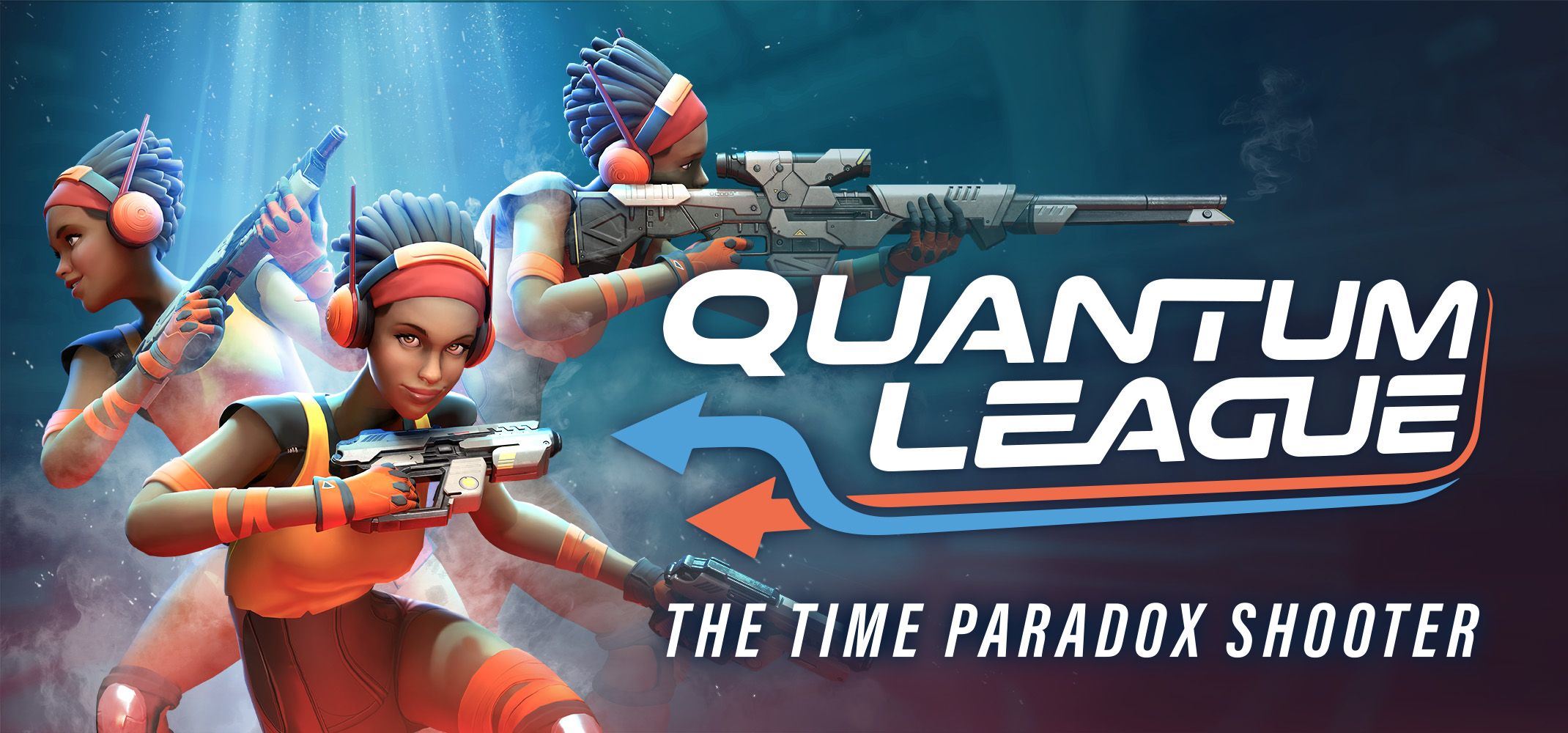
One game that took home a prize at the 2020 GWB Game Awards was Quantum League, from Argentinian studio Nimble Giant Entertainment. Quantum League describes itself as "a revolutionary Time-Paradox Shooter" and while many games tend to overstate how innovative they truly are, Quantum League is not such a case. Unlike many FPS games nowadays that look to expand fights by including twitch-skill necessitating environmental traversal, or by adopting a Battle Royale format, Quantum League encourages players to think not in 3 dimensions, but in 4!
In Quantum League, your teammate is you! Or, rather, previous and future iterations of yourself. Using a time loop mechanic, the game asks you to team up with your past and future selves as you play through each loop of your character one by one. Players are encouraged to outmaneuver their opponents across these loops, considering where they want to be and where their opponent might go. The result is a highly tactical FPS which plays out at a blistering pace.
We were lucky enough to be able to ask the Chief Creative Officer of Nimble Giant Entertainment, Andrés Chilkowski, some questions about the studio and the game. As with all our 2020 winners, we strongly encourage readers to check out the game which you can find on Steam. You can also follow them on social media on the Quantum League twitter channel and the Nimble Giant Entertainment channel.
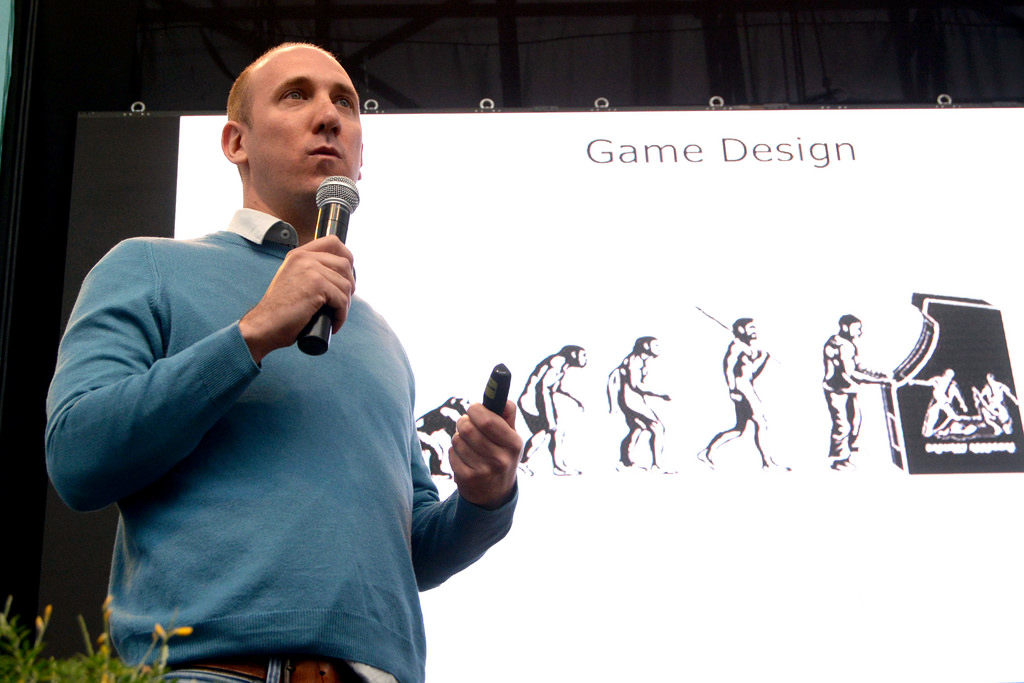
Background
GWB: Just to start, for those who may not be so familiar with Nimble Giant, can you tell us a little about the studio? What is the history, work ethic and philosophy of the studio?
Andrés Chilkowski: Founded in 2002, Nimble Giant is among the very first professional game development studios in Argentina (and also in Latin America actually). Our goal is to become a world class studio and make the kind of games that we love to play (as the hardcore gamers that we are.)
We love tackling projects that are a big challenge. Our first big game was a full-blown MMORPG (champions of Regnum) that we developed from scratch, game engine and backend technology included. A 13-year-old game that is still up and running!
The studio had very humble beginnings, as we bootstrapped it since its inception. The turning point was when we landed the chance to make the reboot of Master of Orion with Wargaming as a publisher.
All of us share this dream of making AAA games in Argentina, so we are almost like a big happy family. We value working as a team and learning from each other. Every single one of us has a true passion for what we do.
This and the fact that we've been around for a long time now, supports our company's tagline: "Built on experience, Fueled by Passion". Reaching this level of proficiency allowed us to take our next big challenge: to deliver a truly innovative Multiplayer First Person Shooter as Quantum League.
GWB: In the past couple of years, we've seen more and more GWB Awards entrants coming from Latin American developers and teams – we've had entrants from Brazil, Argentina, Chile etc., and there's some real quality in there. What's your impression of the game development scene in that region right now?
Andrés Chilkowski: With the rise of global digital distribution and the democratization of game engines and content authoring tools, people from all over the world can make games nowadays.
Argentina has a big entrepreneurial tradition and also a strong presence in adjacent creative industries such as software, film, animation, comics, advertising, etc. Combined with a huge gaming community (something that may have been invisibilized externally due to the rampant levels of piracy) this created the primordial soup for the videogame industry.
After a major economic crisis in 2001, Argentina had an exchange rate to the dollar that allowed us to export our game development services at very competitive prices. This opportunity ignited our sector which grew quite fast riding the mobile and social gaming boom. In the last few years, we have seen the birth of several new studios that capitalized on all of that experience and are now focused on creating their own IP.
We could easily argue that other countries in South America such as Brazil, Chile and Colombia have experienced similar processes in the past two decades. Latin America has a lot to offer to the games industry, our resourcefulness, rich culture and unique artistic sensibility should make our games stand out. We just need more runway (as in time and funding) for our titles to shine.
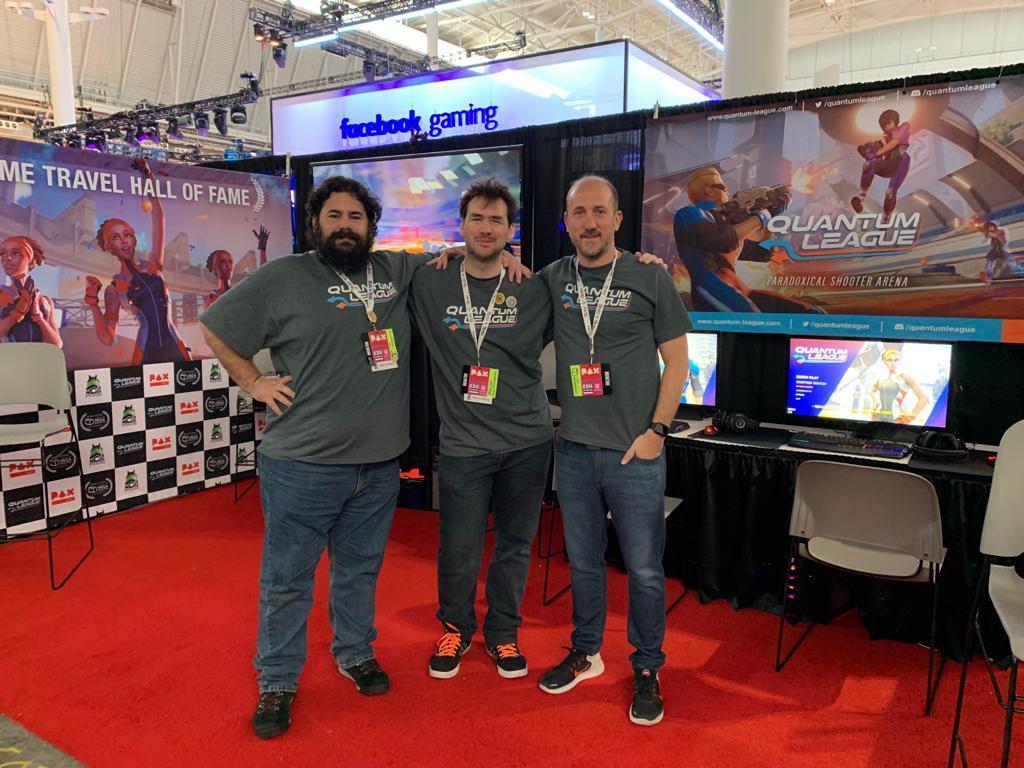
The Game
GWB: What's your pitch for the game? As in, how do you describe it to people who have no idea what it is?
Andrés Chilkowski: Quantum League is a revolutionary Time-Paradox Shooter: a competitive online FPS where you are battling within a time loop, tactically teaming up with your past and future selves in mind-blowing 1v1 and 2v2 matches.
In terms of Game design, we are adding perfect information to the FPS formula: as the cycle loops three times, players gain information about what's going to happen, and they can build strategies around this in order to change the course of time.
A good example of the kind of mind-blowing things that you can do in the game is that if you get killed, say in the first loop, you can shoot your opponent's first clone during the second loop to prevent your first clone from ever dying!
Combine that with the fact that when you are dead you continue playing, recording the potential actions that you may have done in case you don't die and you create the revolutionary mix of fast paced action with mind melding strategy that is Quantum League.
GWB: For players just getting to know your game for the first time, what other games or media would you describe as good reference points / inspirations for this title?
Andrés Chilkowski: Of course sci-fi movies about time travel and time looping have been a strong inspiration. That said, there are variations on the actual mechanics of time travel in most of these movies in terms of causality, paradoxes and alternate timelines.
In the case of Quantum League we have our own mechanics to time travel too. They could be described as a combination of the looping as seen in Edge of Tomorrow, but with the fact that at the end of the loop, the protagonist travels back in time and gets to relive the same segment of time as a different iteration of himself as in Back to the future 2.
When we started doing our research on the topic we came across a popular youtube video by CorridorDigital called Clock Blockers that explores this same idea in the context of a game. This video instantly became one of the points of reference for us and helped us to project the level of complexity that we were diving into as we prototyped the game. Again, our time mechanics are very different, especially in the unique way that we deal with player death.
GWB: The most obvious USP of the game is the time loop mechanic – was this something that was intended from the start? Or was it an idea that developed over time?
Andrés Chilkowski: Yes, from the first one page pitch, the whole concept of the game was about time travel and playing tactically with your past and future selves. The only thing that changed from the original vision is that we decided to transform it into an actual Weaponized Sport. As we were prototyping, we realized that our arenas had to be symmetrical and also very clean with easily identifiable goals and starting positions. The idea of a sporting arena supported all of this.
GWB: Despite being a multiplayer title, the focus is on 1v1 or 2v2 matches, which is very different from a lot of multiplayer shooters we see nowadays, specifically from the Battle Royale genre. Was this intentional? Can you talk a little about the process behind this decision?
Andrés Chilkowski: The 1 vs 1 nature of the game is directly related to the time travel mechanics. To enjoy the game at a high level of play the player needs to remember what is happening during the loop and understand the changes to the timeline. This is more and more taxing the more players you have in the match.
Even when our loops are very short (15 - 20 seconds depending on the arena), there is an extra layer of events added every time you loop. This means that in a 1vs1, after 3 loops, there will be 6 characters battling out on the arena. When we added 2v2 this meant bigger arenas, slightly longer loops and 12 clones during the 3rd and final loop which is quite a lot to handle already.
In the end, we realized that 2v2 is the sweet spot for Quantum League. In order to add more players we would have to change the game mechanics radically or make maps with more isolated areas so the players contributions to the changes in the timeline are more separate (which in the end would break the cooperative factor anyway).
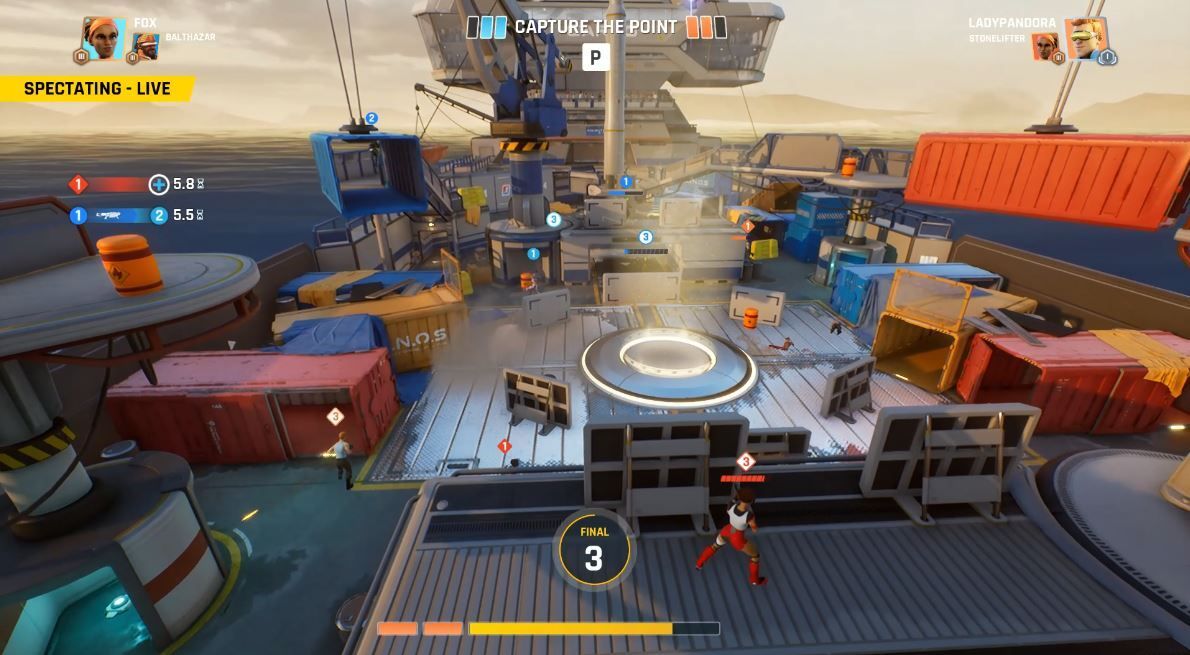
Development
GWB: How did you first start working on the game? What was your original concept?
Andrés Chilkowski: It all started with a company wide brainstorming. One of our game designers was trying to combine a turn based tactical game such as X-com with the feel of a realtime first person shooter. Reflecting upon this, he realized that the difference between turn based games and realtime is not only the fact that time is discrete instead of continuous, but the nature of how the player acquires information in time.
Imagine a typical turn of XCOM: you move your unit, you see an alien, you run out of moves, then you move another unit, and this second unit already has information about the location of that enemy, and you decide to act accordingly.
Now, if you try to map that to an FPS with a continuous timeline. How can you explain that because of a previous move you have this extra information? What if after I move, I go back in time and play that portion of time again? Well... it would feel very much like traveling back through time and experiencing that time all over again. That was the Eureka moment.
GWB: What is the development process like?
Andrés Chilkowski: After the company wide brainstorming which generated around 100 ideas in two days, we selected only eight to be further developed during the rest of the week. From those only three were selected to be prototyped.
The Quantum League prototype was made in a week using Unity. This very rough proof of concept was then presented to the whole studio and the match they played was very exciting. We knew we had something interesting but it had many challenges so we decided to continue developing the game as an experimental project. We shifted to Unreal Engine and assigned a very small team (eight people) to keep developing the idea.
We worked on short iterations, using very simple placeholder graphics for around eight months when we decided to present the game at the Experimental Gameplay Workshop at GDC. After the warm reception we had there we moved into full production.
As the product is truly unique, we wanted to put it in the hands of gamers as quickly as possible. We ran a Closed Beta and embraced open development as much as we could, improving the game with the feedback of actual users.
The production peaked at 35 developers just prior to the Early Access release in May 2020 and continued to improve the game thanks to player feedback since then.
GWB: Can you describe a problem you have encountered during development?
Andrés Chilkowski: We faced many challenges during the development of Quantum League but I would say that the most difficult technical challenge was to make the actual time travel mechanics work in a traditional game engine.
Physics engines are usually chaotic, non-deterministic systems. This means that slight variations in the simulation could have dramatically different outcomes. In our game, we can't just record the events that happened in the previous loops, we have to re-simulate them so they can actually change in future loops. Doing this with a non-deterministic physics engine and in a networked environment with lag compensation was incredibly hard.
On the game design front, I would argue that the most difficult part was to work on the transitions from time clone to another. After you finish a loop, the camera cuts to another character and this was too confusing to our players, so we tried many approaches to transition the camera from one character to another, using clean cuts and different transitions.
In the end, we came up with a system that we called The Curl, where we show the players a few seconds of the previous loop to ease them into the action.
GWB: Did you receive help from others? Was there anyone who gave you advice on development or helped you overcome a problem?
Andrés Chilkowski: We always like to gather feedback and process every piece of advice that we can, the game was in development for a long time so we showed it to every contact we had in the industry. Some are listed in our credits in special thanks for their contributions to the game. We [also] took Early access as part of our open development policy. The game has improved a lot thanks to player feedback since our EA release in May, especially in terms of weapon feel and balance. We also added tons of content including new maps and game modes.
GWB: Did your previous development experience help at all with the development of the game?
Andrés Chilkowski: Even though Quantum League is our first FPS, we had worked on other FPS games as a work for hire in the past and a couple of battle royale prototypes in Unreal (as many other dev teams in 2017). The experience working on those projects laid the foundation for our backend infrastructure, the lag compensation technology and most importantly the advanced weapon handling systems in Quantum League.
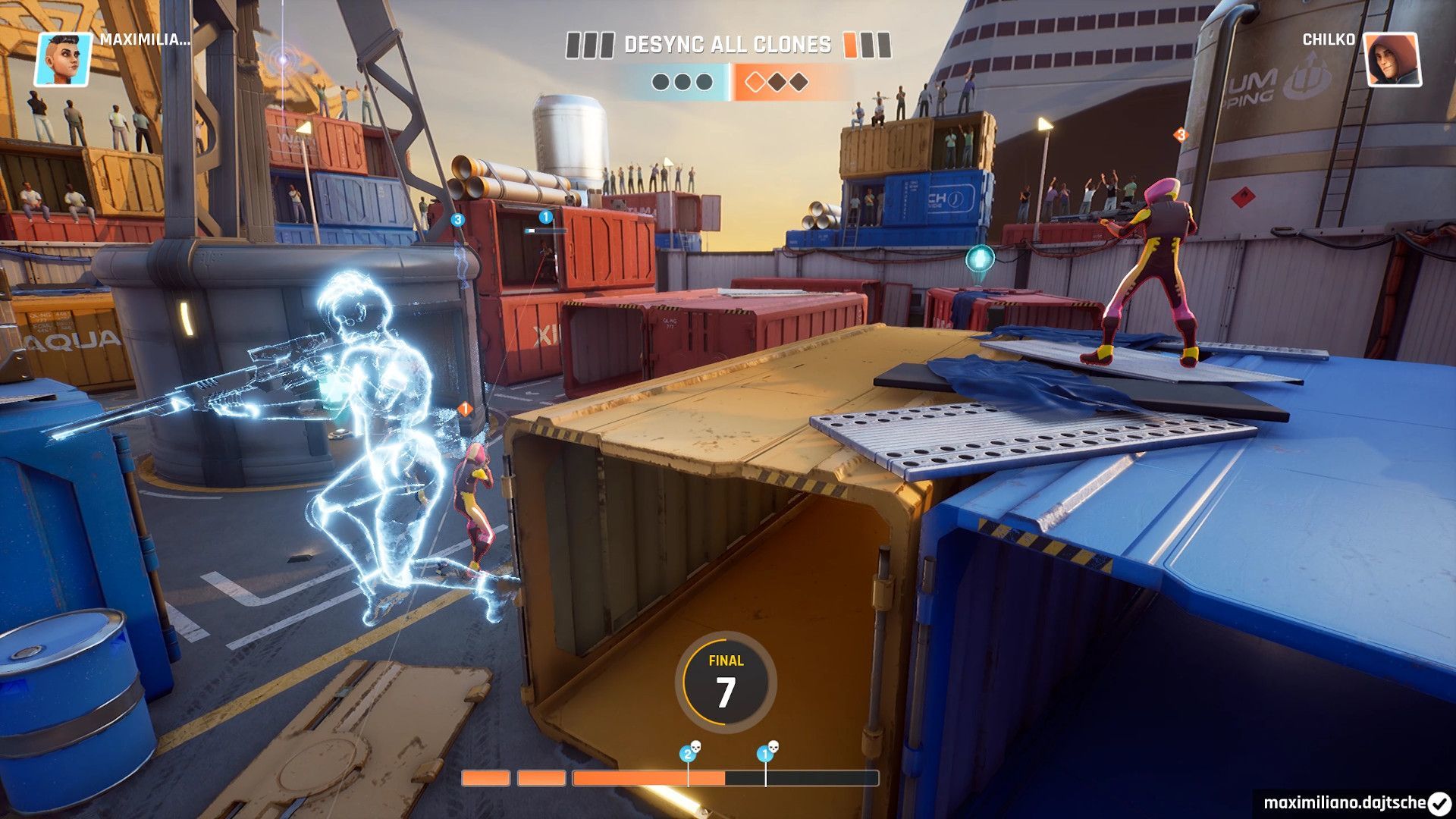
Lessons Learnt
GWB: What, if anything, have you learnt from developing this game?
Andrés Chilkowski: We learned how to quickly iterate and experiment with new features and mechanics even when the game was in advanced stages of development. Almost as if we were using forward design. Trying to discover what the mechanics are offering us in terms of gameplay rather than imposing our design over the experience.
We learned a lot about innovation in general, its risks (it may not be for everybody), its challenges (it's sometimes difficult to explain) and the great rewards - the inherent value of bringing something unique to the market and getting recognition from the community and peers.
We also learned a lot about what makes a good shooter in particular. Every time you fire a gun in a high-end FPS there are tons of things going on, bespoke animations, procedural animations, muzzle VFX, spread patterns, bullet physics, etc. We feel that QL was a great step to become a world class FPS developer.
GWB: Is it difficult to demo and promote a game like this?
Andrés Chilkowski: Quantum League is a game about mastering your understanding of space and time and this is only achievable by playing the game and engaging with the time loop mechanics.
During our early playtests, we realized that players require around three matches to start stretching their 4th dimensional legs. Pitching the game verbally to publishers and the press when the game was in development was extremely difficult.
The biggest challenge when promoting the game is to showcase the depth of the mechanics in a linear medium such as a game trailer. This is why our original cinematic trailers made a lot of emphasis in going back and forward in time.
GWB: What advice would you give to other indie developers approaching a similar type of game?
Andrés Chilkowski: If you are building a truly unique game, put it in the hands of gamers as soon as you can. Even more so if it is a multiplayer experience. The dynamics of the game could be very different to the expected ones, especially at a high level of play. Understanding these kinds of dynamics is crucial to explore the potential of an innovative game.
Final Thoughts
GWB: Finally, is there anything else you would like to add?.
Andrés Chilkowski: We just want to thank GWB for the award!
We would like to thank Andrés and the team at Nimble Giant for their time. For more interviews with winning teams, make sure to follow the Tencent GWB Twitter account (@TencentGWB) and stay tuned for news of our 2021 events coming in the near future.
